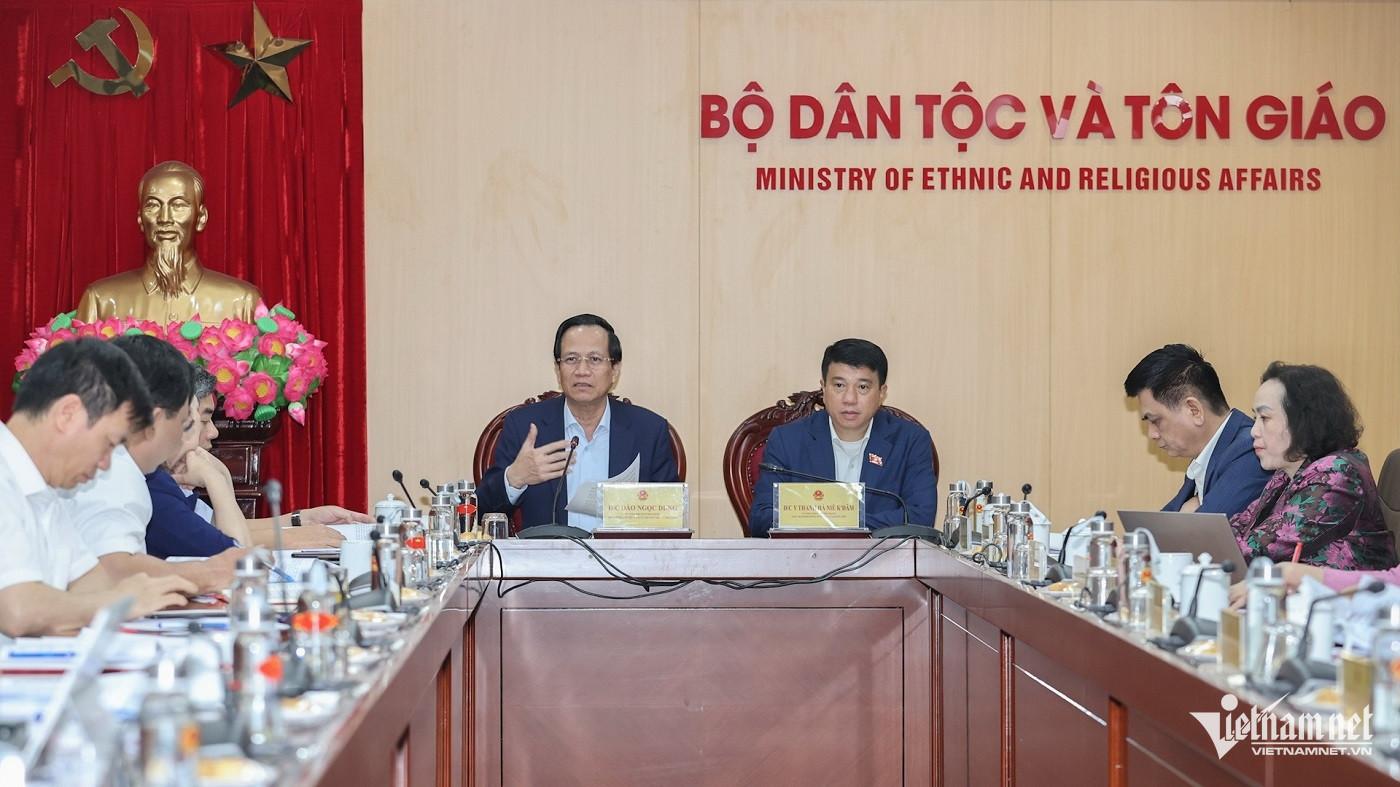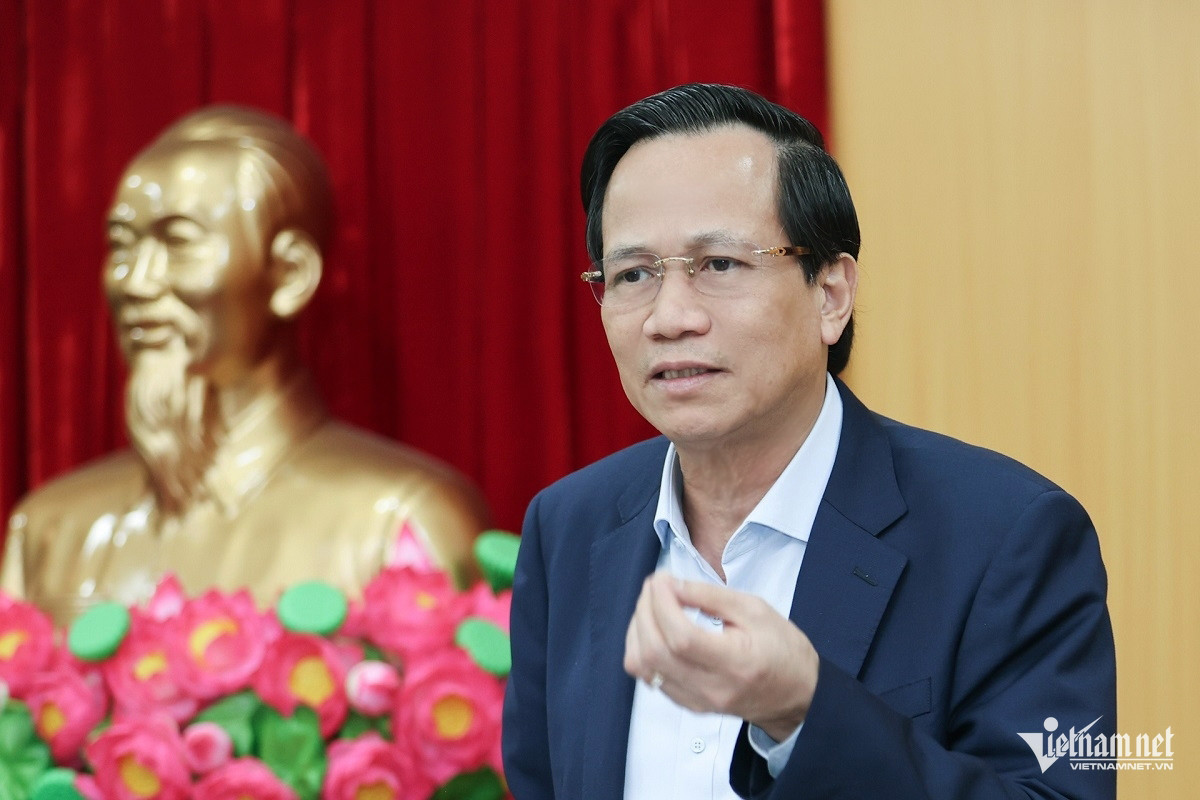The Chairman of the National Assembly's Council for Ethnic Affairs has voiced strong support for several proposals made by the Minister of Ethnic and Religious Affairs, including the need to draft a new resolution on ethnic affairs to replace Resolution 24, issued in 2003 by the 9th Party Central Committee.
Five key priorities in ethnic affairs

Overview of the meeting chaired by Chairman Y Thanh Ha Nie Kdam and Minister Dao Ngoc Dung. Photo: Le Anh Dung
On the afternoon of April 2 in Hanoi, Chairman Y Thanh Ha Nie Kdam and Minister Dao Ngoc Dung co-chaired the first 2025 working session between the National Assembly’s Council for Ethnic Affairs and the Ministry of Ethnic and Religious Affairs. The meeting focused on major issues and policy directions in ethnic affairs.
Chairman Y Thanh Ha Nie Kdam remarked that since the beginning of the current term, the Council for Ethnic Affairs and the former Committee for Ethnic Minorities - now the Ministry of Ethnic and Religious Affairs - have closely coordinated, especially in implementing the 2022–2026 cooperation framework, achieving notable progress in ethnic-related work and policymaking.
With 2025 being a pivotal year in preparing for the 2026–2030 period, the streamlining of administrative bodies overseeing ethnic affairs comes alongside the emergence of new requirements in policy implementation.
The Council Chairman proposed five key discussion points requiring consensus and new approaches.
First is a comprehensive review of the National Target Program for Socio-Economic Development in Ethnic Minority and Mountainous Areas (Program 1719) for the 2021–2025 period. This review aims to identify remaining challenges and define adjustments needed for effective implementation from 2026–2030, while clarifying local governments' roles in the new context.
Second is a proposal for the Party Central Committee to issue a resolution on building a qualified and representative cadre of ethnic minority officials and civil servants to meet development demands. The Council has already suggested including this in the National Assembly Standing Committee's 2025 action plan. The Council also recommended holding a national forum this year on education policy for ethnic minorities.
Third is the need to redefine mountainous and highland zones as well as ethnic minority areas based on development levels. This classification is essential for restructuring the ethnic policy framework.
Fourth is updating the official list and designations of Vietnam’s ethnic groups. The current list, issued by the General Statistics Office in 1979, is outdated. Several groups were arbitrarily merged, causing overlaps. Some groups are requesting recognition under their correct ethnonyms.
Fifth is the consideration of a comprehensive law on ethnic affairs. Currently, although many ethnic-related policies exist, they are scattered across different laws and regulations. The lack of a unified legal framework leads to inconsistency and implementation challenges. Sub-law documents on ethnic development, while flexible, lack long-term stability and comprehensive scope, and fail to fully institutionalize Party guidelines and constitutional provisions.
Proposing a new resolution to replace Resolution 24

Speaking at the meeting, Minister Dao Ngoc Dung emphasized that ethnic and religious affairs are strategic for national development, particularly in today’s rapidly evolving and sustainability-driven environment.
He expressed strong agreement with the five priorities suggested by Chairman Y Thanh Ha Nie Kdam.
“All five tasks must be pursued in unison, following the ‘six clears’ principle repeatedly emphasized by the Prime Minister: clear responsibility, clear tasks, clear timelines, clear accountability, clear outcomes, and clear authority. The Ministry will develop a plan, form working groups, and invites the Council to appoint representatives to participate,” said Minister Dao Ngoc Dung.
However, he proposed reconsidering the issuance of a separate resolution on building the ethnic minority civil servant force. Instead, he advocated for drafting a new overarching resolution on ethnic affairs to replace Resolution 24, which was issued in 2003.
“We should focus on submitting a review of Resolution 24 to the Party Secretariat and Central Committee, then draft a new resolution by the Party Central Committee. This would lay the foundation for introducing special policy frameworks to support the development of a qualified ethnic minority leadership, promoting sustainable national growth,” the Minister explained.
Vice Chairwoman Cao Thi Xuan of the Council for Ethnic Affairs agreed, noting: “Resolution 24 was issued in 2003 - 22 years ago. Since then, the Political Bureau has issued Conclusion 65 on ethnic affairs in the current context, but many points are outdated. It’s essential to propose a new resolution to the Party Central Committee to replace Resolution 24.”
Council Chairman Y Thanh Ha Nie Kdam also fully supported the idea: “We must begin the review of Resolution 24 and propose a new resolution to establish a political foundation for ethnic affairs in the new era.”
Special programs require special mechanisms
Regarding Program 1719, Minister Dao Ngoc Dung announced that a national conference to review Phase I will take place in April. The Ministry plans to propose key focal areas for Phase II (2026–2030), to be submitted for approval. The new phase will prioritize essential infrastructure, vocational training, and livelihood development for ethnic minority communities.
For unachieved targets, he called for innovative thinking to overcome hurdles.
“For example, funding for eliminating dilapidated housing is available, yet many provinces claim difficulties because residents don’t have land-use certificates. If we wait for the paperwork, it might take another ten years. Let’s set a new precedent - if a household has lived in one place for a long time without disputes, just go ahead and build. Empower local governments - they know the residents best,” he suggested.
The Minister also emphasized: “Special programs require special mechanisms. Beneficiaries of Program 1719 are among the most vulnerable - there should be no matching fund requirements placed on them.”
Binh Minh